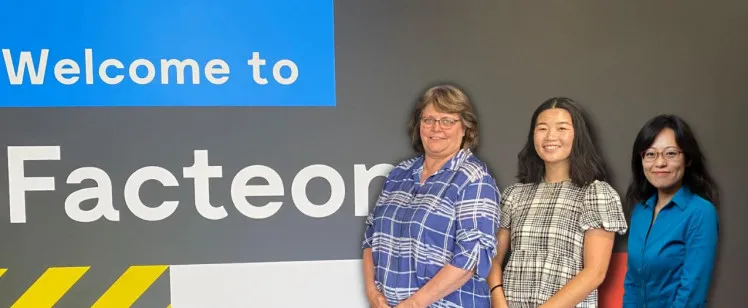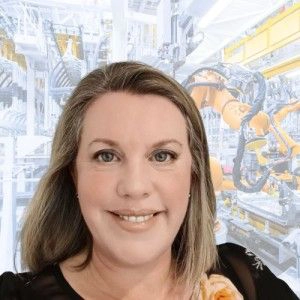Role Models are Key when Attracting Women into Engineering
Specialists in smart manufacturing, automation, and Industry 4.0, Facteon are at the innovative edge of engineering, and a sector at the forefront of technological change. Vicky Pratt, Debbie Peng and Dr Yan Jia, span engineering and procurement at Facteon, and they all help customers rapidly adapt their production lines to meet labor shortages, improve safety in the workplace, and increase manufacturing efficiency.

Growing and developing women in leadership roles
“I saw engineering as a career in which I can make a difference in society,” says Facteon’s Concept Engineering Team Leader Dr Yan Jia, who graduated in 2004. “There is still that feeling we need to work harder than our male counterparts to ‘prove’ that we are equally competent. However, those barriers are gradually coming down as women have been playing an increasingly key role in creating and innovating new technologies and systems in the engineering industry. Today, many women are rising to leadership positions, and managing teams, projects, and companies.”
Junior Automation Engineer Debbie Peng highlights the importance of senior role models to female engineers who are just starting out in their careers. “We’re starting to see more representation of women in engineering, especially in leadership roles. Strong communities are forming. In social media, for example, I’m seeing more and more content that provides support and mentorship for women in STEM [science, technology, engineering, and math] in a relatable and engaging way.”
How to encourage more women into the industry
Vicky Pratt is a Senior Procurement Specialist in Facteon’s manufacturing team. She grew up with both parents practicing engineering; strong, present role models whose encouragement was reinforced at school.
“I was lucky to have great teachers in math and science, and our head teacher always told us to have our minds open to all careers, since anything is possible when you work hard at it.’
For Debbie it was those female role models who sparked her own interest in engineering as a career. She believes the best way to encourage women to consider engineering is to have women in engineering advocate for it.
“I remember going to the University of Auckland’s Enginuity day as a high schooler and hearing all the women speak about their experiences in industry and as engineering students. I thought, ‘Wow! All these women are so cool!’ While there are great initiatives within university, I think we still need more within industry to support our women in engineering,” says Debbie.
Yan agrees, saying encouraging girls to explore engineering from a young age can help to spark their interest and confidence in the field. Now that she’s part of the industry, she gains support through networking events and women in engineering committees.
She points to this year’s international conference of the Institute of Electrical and Electronic Engineers being held in Auckland in August 2023. The theme of the conference is “Automation for a Resilient Society,” and Yan says the IEEE’s Robotics and Automation Society has a women in engineering group, which will be discussing the topic of diversity.
She says companies can also do more to prioritize diversity in their recruiting process and offer flexible work arrangements.
What do women bring to the table?
Women are known to have strong collaboration and teamwork skills, and Yan says these can be vital in engineering projects that require close coordination between multiple team members.
“Effective communication is essential in engineering projects, and women often excel at communicating complex technical information to both technical and non-technical audiences. Attention to detail is also critical in engineering projects, and women often have strong analytical and organizational skills that help to ensure projects are completed to a high level of quality.”
Debbie agrees. “Hands down, being a team player and a good communicator are the most important attributes to have as an engineer. You can have the most brilliant engineering mind, but it won’t mean anything if you can’t communicate your ideas. Also, the biggest trap in any project is having people who think the exact same way. Women bring new perspectives that can challenge the status quo and bring about innovative and creative solutions, and good businesses recognize that in their recruiting strategy.”
Where do women lead and where are they emerging as leaders?
Yan says women are making contributions across a wide range of engineering sectors, including environmental, biomedical, and software. However, she believes there are still some areas where they are underrepresented, such as civil and mechanical.
“AI and machine learning are rapidly changing the way we live and work, and women are driving many of these innovations. Robotics and automation are becoming increasingly important in a wide range of industries. Female engineers are working on developing new robots and automated systems that can improve efficiency, safety, and quality.”
Debbie sees a growing focus on sustainability as one of the biggest shifts the industry is making. “I am excited to see engineers playing a critical role in developing solutions that support a more sustainable world.”
Advice for aspiring engineers
Yan encourages women to seek out mentorship and networking opportunities. “You should also build your technical and soft skills. Be proactive and take initiative. Prioritize work–life balance.”
Debbie adds a further, supportive perspective. “You won’t always have the answer to a problem straight away, but you should always trust in your own ability to figure things out. It can seem quite daunting starting off as an engineer. Often, we’ll find ourselves thrown in the deep end and experience imposter syndrome. Just remember that everyone is constantly learning, no matter how long they’ve been in the industry.”
“Learn to be able to laugh at yourself,” says Vicky. “Don’t take everything that may be said seriously. Always strive to be the best you can, and satisfy any thirst you have for knowledge. Drive yourself into new roles and areas—whatever takes your interest, whether it is in your job description or not.”
Find out more
If you’d like to speak with one of our female engineers about work in the industry and working at Facteon, contact Human Resources at HR@facteon.global.

Kate Watson
Kate leads Facteon’s HR function, which includes looking after our people based in New Zealand, the USA, and Mexico.
With a background in law, Kate is a highly experienced HR professional with experience across the public and private sector. Kate is a trusted business advisor committed to building positive, high-performing work cultures.

